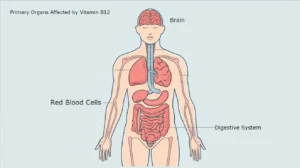Table of Contents
Recognizing Vitamin B12: Essential Benefits, Signs of Lack, and Ways to Increase the Levels
Vitamin B12, also referred to as cobalamin, is an important nutrient that contributes to many vital functions within our bodies. Our health would be compromised if vitamin B12 were lacking, since this vitamin supports DNA synthesis and helps in the production of red blood cells. Many may not know it, but they are being deprived of vitamin B12, which could cause a thousand and one health problems. In today’s post, we investigate the benefits of vitamin B12, how to identify insufficiency, and pragmatic advice on how to naturally replenish B12 levels.
What is vitamin B12 and explain its significance.
Vitamin B12 is a water-soluble vitamin required for normal neuron function, blood cell production, and DNA synthesis.
Our bodies cannot produce vitamin B12. This means we have to take it either from our diet or by using supplements. The main sources of this vitamin are meat, seafood, dairy products, and eggs. This might be one of the reasons it could be challenging for a vegan and vegetarian to obtain the sufficient amount of this vitamin through their diet.
The absorption may be impaired, leading to B12 deficiency in elderly people and patients of certain diseases.
Important Functions of Vitamin B12:
Thus, Vitamin B12 is very essential for the conversion of food to glucose that is the prime energy source for the body. You will experience weakness and weakness if your vitamin B12 levels are low.
It is important that our nervous system is in good health. It helps maintain the myelin sheath of our nerve cells, acting as a protective covering. This coating is required to ensure the proper and effective transmission of nerve signals.
Vitamin B12 helps to prevent anemia by encouraging the body to make red blood cells, which are responsible for transporting oxygen to various areas of the body.
DNA synthesis is crucial for cell division, which keeps our skin, hair, and nails healthy. ( National Institutes of Health (NIH) – Vitamin B12 )

A deficiency in vitamin B12:
Lack of B12 may affect most systems only at first slightly because it is necessary for most body activities. Now here are some common signs to which to pay attention:
You feel weak and tired? Fatigue may result from low vitamin B12 levels since they affect our bodies’ capacity to produce energy. As a result of this, even though you are not exercising much, your muscles might be weak.
It means issues with your nerves may be from inadequate vitamin B12. These symptoms include tingling or numbness in your hands and feet, along with the problem of balancing. This is because B12 plays very critical roles in the function of our nerves.
Low levels of vitamin B12 can cause problems with memory and attention in aged persons, especially including brain fog, forgetfulness, and the inability to focus. B12 deficiency causes problems in mood, which includes anxiety and despair, due to the fact that vitamin B12 is critical in keeping our brains healthy.
Jaundiced or Pale Skin: Vitamin B12 helps in the production of red blood cells. A person who does not get enough B12 may develop anemia which could cause pale or jaundiced-looking skin.
Some early signs of deficiency in vitamin B12 may include glossitis, commonly known as mouth sores, and swelling of the tongue, or glossitis.
A Deficiency in vitamin B12 could impact whom:
Many situations may elevate your risk for having a deficiency of B12. The following groups are often put at risk
The changes of age affect how the human body digests food; therefore, vitamin B12 absorption capacity in the body is reduced.
Vegetarians and vegans must know that these diets normally do not contain vitamin B12. In order to obtain adequate amounts of this essential vitamin, individuals who follow these diets will generally have to include fortified foods or supplements. People who have digestive disorders may not able to absorb vitamin B12 because the body might suffer from Crohn’s disease, celiac disease, and other types of bacterial overgrowth.
Individuals Taking Particular Drugs: Proton pump inhibitors, which are used to treat acid reflux, and metformin, which is used to treat diabetes, might impair vitamin B12 absorption if taken for an extended length of time.
Natural Means of Increasing Vitamin B12 Levels

If your doctor has diagnosed you with a B12 deficiency or you’re concerned about your level, there are many ways to boost the levels. Let’s examine some successful strategies:
1) High B12 meals. In most cases, people are advised to take more portions of food rich in vitamin B12. The list of the high vitamin B12 content foods is as follows:
- The common animal-based proteins are poultry, liver, fish like salmon and tuna, and cattle.
- Examples of dairy products include milk, cheese, and yogurt.
- This is a fantastic food source, and the yolk alone contains a high quantity of vitamin B12.
- Plant-based milk, nutritional yeast, and some morning cereals are great sources of B12 for vegans and vegetarians.
2) Supplements of vitamin B12 should be considered. If you find that your diet isn’t giving you enough or you’re in a higher-risk group, supplementing with vitamin B12 may be a simple and beneficial remedy. Many forms are available, including tablets, sublingual tablets that are placed under the tongue, and even sprays. Other people may require higher dosages or injections to maintain the required levels, especially if their bodies are not absorbing the nutrients required.
3) Plant-based foods that are fortified with added nutrients to enhance their health benefits will be considered. These are ideal for those who prefer a plant-based diet and want to increase their vitamin and mineral levels. B12 has been added to morning cereals, a range of nondairy milk products, and even some nutritional yeast types. These will help prevent deficiencies when taken with plant-based diets.
4) Maintenance Tests It is recommended to undergo periodic blood tests to check your B12 levels if you come under one of the risk groups. Discuss with your doctor if you go through any symptoms, including, but not limited to, chronic fatigue, mood swing, or tingling. They might send you to get blood tests to assess the condition.( Exercise )
Conclusion :
You should get a B12 blood test from your doctor if you feel weak or experience tingling. B12 is an energy, brain function, and nerve health component that cannot be produced by your body; therefore, you should have enough amounts through food or supplements if you are at higher risk.


 Visit Our Google News Page
Visit Our Google News Page